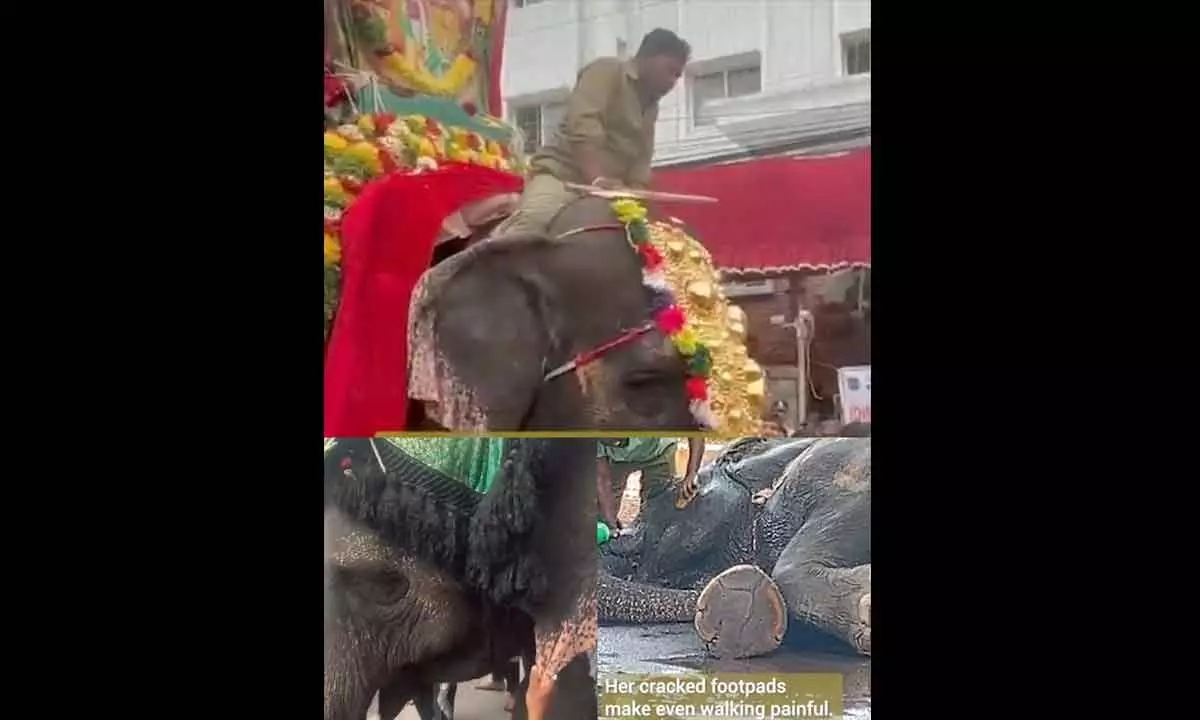Live
- Jagan turned AP into ‘Adani Pradesh’, slams Sharmila
- AP to be made global sports hub
- APEPDCL to promote solar power extensively
- No LoP, but will continue spirit of Lokayukta: Lokesh
- No question of reducing Polavaram project height
- Constable found dead with bullet injury
- People told to be honest to get US visa
- Beneficiaries can now get 2 months pension in 3rd month
- 50 lakh benefited from Deepam-2 so far: Nadendla
- Promote handlooms, Minister tells people
Just In
Fraudulent Health Certificates for Elephant Roopavathi Issued, Condemns Cruelty During Bonalu Processions: PETA


Bengaluru: Following elephant Roopavathi’s transport from Karnataka under a health certificate with false claims and permission for her use in...
Bengaluru: Following elephant Roopavathi’s transport from Karnataka under a health certificate with false claims and permission for her use in Telangana for a procession, People for the Ethical Treatment of Animals (PETA) India urgently called for the revocation of the veterinary licences of the veterinarians who are responsible for allowing her transfer and use. The group seeks accountability for and action against Karnataka veterinarian Dr Sathish and Telangana veterinarians Drs M Navin Kumar, M Abdul Hakeem, G Shambhulingam, and B Sambasiva Rao, who falsely declared Roopavathi to be in good health even though she is unilaterally blind in the right eye and has feet with overgrown cuticles and cracked footpads. Her gait also shows arthritic changes and lameness. Accordingly, PETA India has written to Karnataka and Telangana veterinary councils to report malpractice.
On 13 July, Roopavathi was transported from Karnataka to Telangana for participation in Muharram and Bonalu processions based on false veterinary declarations of her health. A recent comprehensive examination conducted by independent wildlife veterinarians has, however, determined that Roopavathi is unfit for public events due to severe health issues, including unilateral blindness indicated by her sunken right eye and dependency on auditory and tactile cues for navigation; stiffness and lameness in both forelegs due to arthritis; brittle and cracked footpads from improper housing conditions, with overgrown cuticles leading to potential laminitis; and an unhealed wound on her left hindquarters, signifying gross negligence and inadequate care.
These health issues demonstrate that Roopavathi is in a state of prolonged physical suffering and requires immediate rehabilitation at a reputable sanctuary where she can live unchained and in the company of other elephants. Her transport permit, which mandated that the elephant be in good health, is rendered invalid by her poor health, thereby making her transfer from Karnataka and participation in public events in Telangana apparently unlawful and in direct violation of the issued permit. The issuance of these health certificates with fraudulent claims constitutes a severe breach of veterinary ethics and is a violation of The Prevention of Cruelty to Animals Act, 1960, and the Wild Life (Protection) Act, 1972.
A close look at the Muharram and Bonalu processions live-streamed across news channels and on YouTube on 17 and 22 July, respectively, shows a caparisoned Roopavathi carrying men and walking amid thousands of people. PETA India documented that in her weak health condition, Roopavathi was forced to walk the procession routes for up to nine hours for Muharram and a couple of hours for Bonalu. The crowd that thronged the routes made it impossible for her to maintain any distance from the public. Loudspeakers continuously played at a loud volume for hours. Such noise and chaos are traumatic for any elephant – and Roopavathi was also controlled by the use of weapons, including a painful and banned ankush. Her ears were continuously pulled and her anal cavity prodded to force her forward.
These acts violate her transfer permit – dated 10 July 2024 and issued by the principal chief conservator of forests (wildlife) and chief wildlife warden of Karnataka – and her ownership certificate, dated 15 November 2022, as they prohibit using Roopavathi in crowded areas and for processions during the day and exposing her to loud noise, as well as specifically prohibiting making her walk on tarred roads. She was barely given any rest after her journey by road from Karnataka to Telangana and for the long durations of the Muharram and Bonalu processions.
“Subjecting an unfit and ailing elephant to the stress of public processions is both inhumane and reckless, as upset elephants often attack,” says PETA India Manager of Veterinary Services Dr Bandhanpreet Kaur Raisim. “The certificates issued to allow this ailing elephant to parade are an eyewash, and we demand strict action against the misleading veterinarians.”
PETA India had offered to fund and facilitate the use of a life-size mechanical elephant for the Muharram and Bonalu processions instead of a real elephant. These realistic mechanical elephants can replicate the experience of using a real animal without causing harm, thereby ensuring both human safety and animal welfare.
With celebrity support, PETA India has already donated four life-size mechanical elephants – Irinjadappilly Raman to the Irinjadappilly Sree Krishna Temple in Thrissur, Mahadevan to the Thrikkayil Mahadeva Temple in Kochi, Baladhasan to the Pournamikavu Temple in Thiruvananthapuram, and Shiva to Sri Veerasimhasana Mahasamsthana Math in Mysuru – in recognition of the temples’ decisions never to own or hire live elephants. These and other mechanical elephants are now used to conduct safe, cruelty-free ceremonies at temples, allowing real elephants to remain with their families in nature.

© 2024 Hyderabad Media House Limited/The Hans India. All rights reserved. Powered by hocalwire.com






